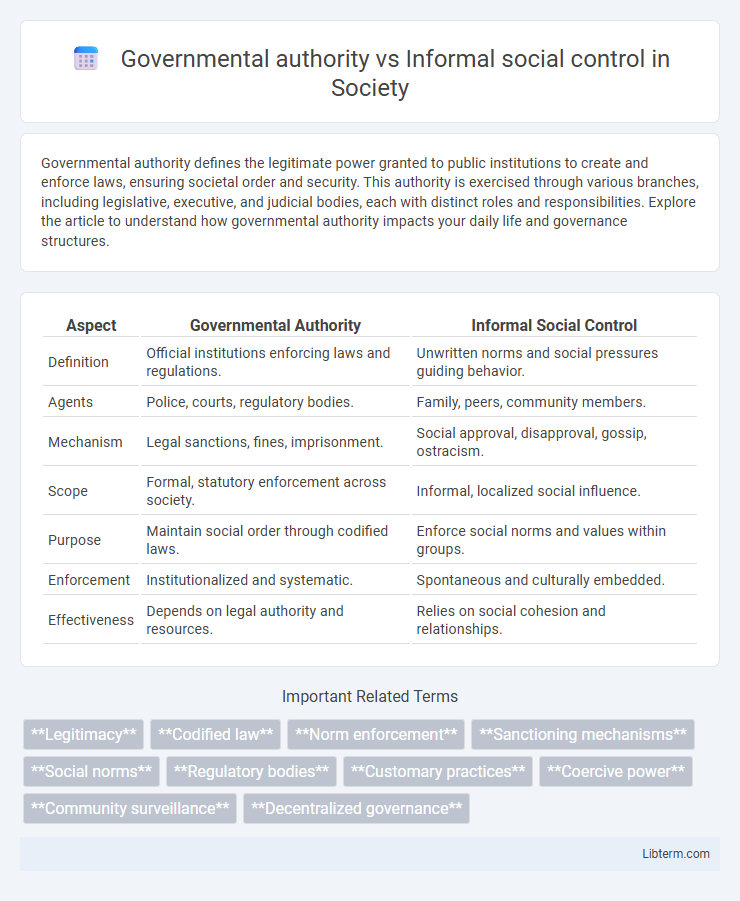Governmental authority defines the legitimate power granted to public institutions to create and enforce laws, ensuring societal order and security. This authority is exercised through various branches, including legislative, executive, and judicial bodies, each with distinct roles and responsibilities. Explore the article to understand how governmental authority impacts your daily life and governance structures.
Table of Comparison
| Aspect | Governmental Authority | Informal Social Control |
|---|---|---|
| Definition | Official institutions enforcing laws and regulations. | Unwritten norms and social pressures guiding behavior. |
| Agents | Police, courts, regulatory bodies. | Family, peers, community members. |
| Mechanism | Legal sanctions, fines, imprisonment. | Social approval, disapproval, gossip, ostracism. |
| Scope | Formal, statutory enforcement across society. | Informal, localized social influence. |
| Purpose | Maintain social order through codified laws. | Enforce social norms and values within groups. |
| Enforcement | Institutionalized and systematic. | Spontaneous and culturally embedded. |
| Effectiveness | Depends on legal authority and resources. | Relies on social cohesion and relationships. |
Introduction to Social Control Mechanisms
Governmental authority enforces social control through formal institutions such as laws, regulations, and law enforcement agencies that ensure compliance and maintain order. Informal social control relies on community norms, customs, and social sanctions like peer pressure and family expectations to influence behavior without legal intervention. These mechanisms work together to regulate societal conduct, balancing official enforcement with cultural and social influences.
Defining Governmental Authority
Governmental authority is the officially sanctioned power exercised by institutions such as the police, judiciary, and legislative bodies to enforce laws and regulations within a state. It operates through formal mechanisms, including legal codes, regulations, and administrative procedures, ensuring compliance and maintaining public order. This authority is distinct from informal social control, which relies on social norms, customs, and community-enforced expectations rather than codified laws.
Understanding Informal Social Control
Informal social control operates through family, peers, and community norms rather than formal laws enforced by government authorities. This type of social regulation relies on socialization, shared values, and collective expectations to maintain order and influence behavior. Understanding informal social control reveals how everyday interactions and social networks foster conformity and deter deviance without formal sanctions.
Historical Evolution of Social Control Systems
Governmental authority emerged as formalized social control during the rise of centralized states, codifying laws and implementing institutions like police and courts to regulate behavior. Informal social control predates formal systems, relying on social norms, customs, and community enforcement mechanisms rooted in kinship and tradition. The historical evolution of social control systems reflects a shift from predominantly informal practices to complex formal structures accompanying state formation and urbanization.
Key Differences Between Governmental and Informal Control
Governmental authority enforces laws through official institutions such as courts, police, and regulatory agencies, relying on formal sanctions and legal procedures to maintain social order. Informal social control operates through community norms, peer pressure, and socialization processes without codified rules or formal enforcement mechanisms. Key differences include the source of authority, the nature of sanctions--legal versus social--and the scope of influence, with governmental control applying universally and informal control varying across different social groups.
Case Studies: Formal vs Informal Mechanisms
Case studies reveal that governmental authority relies on codified laws, policing, and judicial systems to enforce formal mechanisms, ensuring legal compliance across societies. Informal social control operates through community norms, peer pressure, and cultural expectations, often resolving conflicts without recourse to formal institutions. Comparative analyses demonstrate how formal mechanisms provide consistent enforcement, while informal controls foster social cohesion and adaptability within local contexts.
Impact on Social Order and Compliance
Governmental authority enforces social order through formal laws, regulations, and official sanctions, ensuring consistent compliance across populations. Informal social control relies on community norms, peer pressure, and socialization processes to maintain behavior standards, often fostering internalized compliance. The combination of both systems strengthens social cohesion by balancing rigid enforcement with adaptive, culturally embedded practices.
Limitations and Challenges of Governmental Authority
Governmental authority faces limitations such as bureaucratic inefficiency, reliance on formal legal frameworks, and difficulties in adapting to rapidly changing social dynamics. Challenges include enforcing laws uniformly across diverse populations and balancing state power with individual freedoms, often leading to gaps in social order. In contrast, informal social control operates through community norms and peer influence, effectively addressing social behaviors that formal institutions may overlook or handle too rigidly.
Strengths and Weaknesses of Informal Control
Informal social control relies on community norms, peer pressure, and socialization to regulate behavior, providing flexibility and immediate feedback without formal sanctions. Its strengths include fostering social cohesion, adaptability to diverse cultural contexts, and low enforcement costs. However, informal control faces weaknesses such as inconsistency, potential for bias, and limited effectiveness in addressing serious offenses or large-scale disorder compared to governmental authority.
Integrating Formal and Informal Social Controls for Effective Governance
Integrating formal governmental authority with informal social control mechanisms enhances effective governance by leveraging legal frameworks alongside community norms and values. Formal institutions enforce rules through laws, regulations, and sanctions, while informal controls rely on social relationships, reputation, and cultural expectations to maintain order. Combining these approaches fosters cooperative compliance, increases legitimacy, and strengthens societal cohesion in managing public affairs.
Governmental authority Infographic

 libterm.com
libterm.com